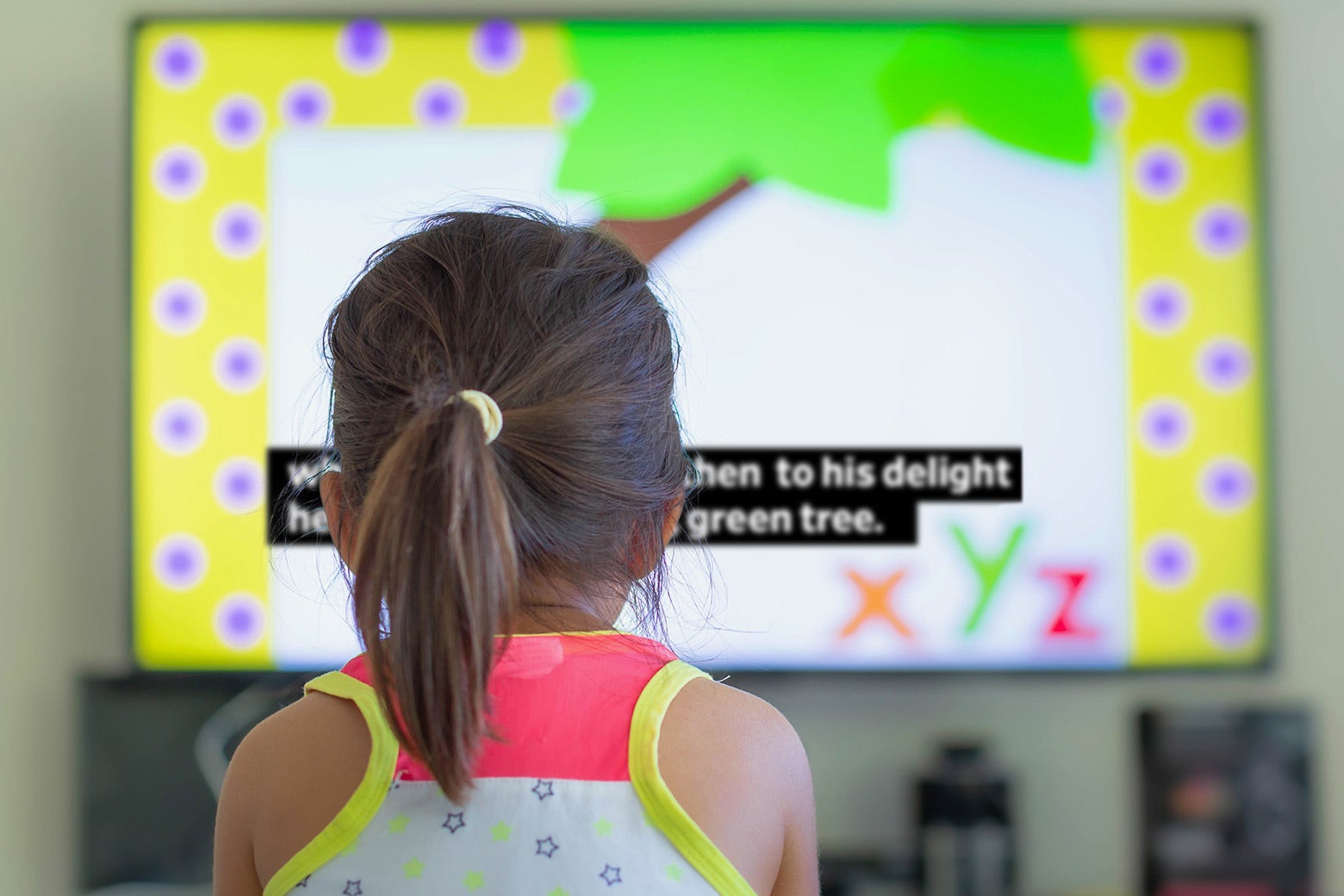
Parents: Turn on the TV Subtitles!
Reading Time: 4 minutesThere’s a Way to Make Screen Time Beneficial for Kids, There’s good evidence that it will help your child learn to read., Screen time can benefit kids: Turn on the subtitles. It will help them learn to read.
When my daughter starts an episode of CoComelon for the umpteenth time, I no longer feel mum guilt. It’s not that she’s singing ‘Yes, yes, yes, I want to eat my spinach’ like a brainwashed Stepford child. (She is, and yet, she will not eat spinach.) It’s that she’s watching with subtitles, which, the current science suggests, will help her learn to read. And kids may need all the help they can get—global statistics released last month show that child literacy has declined in most countries since the previous assessment five years prior.
Some people absolutely loathe subtitles, outside of their use for foreign-language films or cases when the viewer really cannot hear the audio, making the case that they ruin the art. I say: If you’re not already part of the 40 percent of streamers always watching content with subtitles on, now’s the time to jump ship—at least when your kids are watching.
The magic of subtitles seems to rest on three main pillars. The first is that they are unignorable. If you can read, you’ll find yourself reading along with subtitles automatically; if a child can’t read yet, their eyes will still be drawn to them. The second is that subtitles don’t detract from the viewing experience, at least based on the fact that once they’ve been switched on, fewer than 2 in 100 children switch them back off. Finally, once the child is engaged and looking at the subtitles, as long as they have at least some ability to match letters to sounds, then benefits will begin. Subtitles allow direct links to be made between sound, meaning, and text in real time, allowing for both reading and language development. The benefit for literacy is so strong that India recently passed legislation that, by 2025, 50 percent of mainstream television will need to have subtitles on by default. And a global literacy project called Turn On The Subtitles is working to implement similar ideas in children’s programs across streaming platforms and U.K. broadcasting.
The first evidence for this came as a surprising byproduct of research in the 1980s on captions for children who were deaf or hard of hearing. Researchers found that that the subtitles were just as beneficial to those children in the study who could hear. Morton Ann Gernsbacher, another investigator in the area, compares this to an elevator—initially developed for persons with disabilities, but actually benefiting all. Loads more research has been carried out since then, and last year the results of all these separate tests were put together and analyzed in one overarching study. This confirmed the beneficial link in languages as varied as English, Japanese, Greek, Arabic, and Chinese.
Subtitles are particularly helpful for children just learning how to read and early readers. With constant access to subtitles, the relationships between sound and text are strengthened gradually and subconsciously. Think of it as a form of parenting by stealth—your kid will automatically learn, even if the subtitles haven’t been pointed out. And the fact that they never seem to tire of watching the same programs over and over again further cements this, strengthening the connection between sounds and letters each time. Henry Warren, co-founder of Turn on the Subtitles, has said he likes ‘to think of it a bit like sneaking vegetables into dinner, the children don’t notice, but you know you’re doing them the world of good.’
Subtitling is no replacement for reading books, but it can help to level the playing field for children who show no motivation to read, or households that cannot afford to buy many books per year. And in motivated readers, subtitling works in tandem with reading to enhance vocabulary and literacy. The number of words an average child may be exposed to in a year by watching subtitled television has been compared to ‘reading the same number of words that are in: all of the Harry Potter books, all of the Earthsea books, all of His Dark Materials, all of the Narnia saga and all of The Lord of the Rings.’
A recent study took this further, comparing vocabulary covered across children’s programming in the U.S. to core vocabulary required for early reading. Researchers showed that the right combo of word variety and repetition is present to develop literacy if a child watches one hour of television daily for two years.
As kids grow up, the other clear benefit is in learning new languages. Here there’s no reason for any stealth parenting—children’s reactions to using subtitles in this manner are overwhelmingly positive. In one study, when asked whether she would like more access to such content, a girl even said, ‘I would actually buy TV that only did that if I could.’ Others commented on further benefits such as increased cultural awareness and better pronunciation.
In an era where ‘screen time’ gets such bad press, it’s relieving to see that it can be beneficial if used wisely. After all, no matter what momfluencers may have you believe, most children spend at least some time zombified in front of cartoons at some point or other. So follow my lead, switch on the subtitles, and enter a beautiful state of guilt-free Zen for a while. If only it were so easy to get my daughter to eat veggies.
Ref: slate
MediaDownloader.net -> Free Online Video Downloader, Download Any Video From YouTube, VK, Vimeo, Twitter, Twitch, Tumblr, Tiktok, Telegram, TED, Streamable, Soundcloud, Snapchat, Share, Rumble, Reddit, PuhuTV, Pinterest, Periscope, Ok.ru, MxTakatak, Mixcloud, Mashable, LinkedIn, Likee, Kwai, Izlesene, Instagram, Imgur, IMDB, Ifunny, Gaana, Flickr, Febspot, Facebook, ESPN, Douyin, Dailymotion, Buzzfeed, BluTV, Blogger, Bitchute, Bilibili, Bandcamp, Akıllı, 9GAG